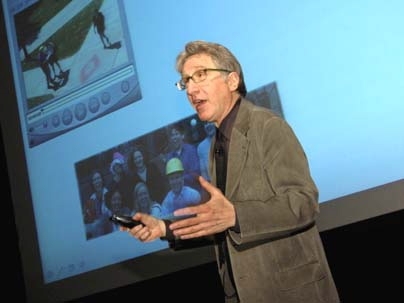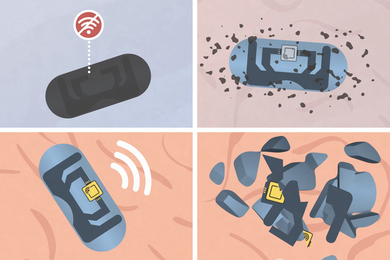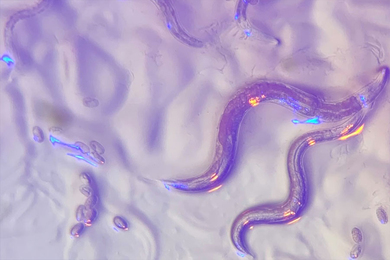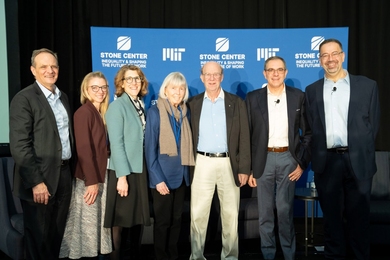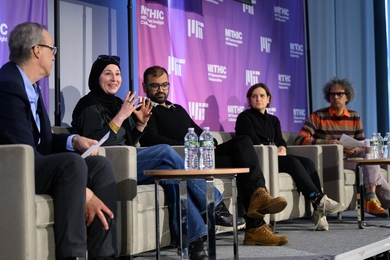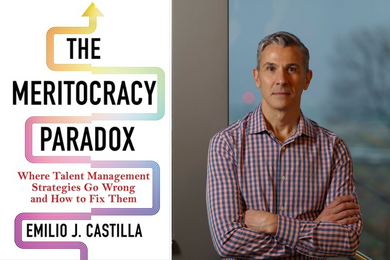"What is consciousness in the brain?"
According to MIT alumnus Ned Block, whose talk last week explored the reaches of what is known about the human mind, "A lot of our conscious experience is experience we don't even know about. That is experience that happens very quickly fades before it gets to our conceptual, cognitive system."
A professor of philosophy and psychology at New York University, Block received the Robert A. Muh Alumni Award and delivered his talk on Wednesday, March 2, in Bartos Theater.
The Muh Award honors an MIT graduate for noteworthy achievements in the humanities, arts and social sciences. Block received the S.B. degree in physics and humanities in 1964 and taught philosophy at MIT for 25 years, serving for six years as chair of the philosophy section in the Department of Linguistics and Philosophy.
Philip S. Khoury, Kenan Sahin Dean of the School of Humanities, Arts and Social Sciences and professor of history, presented the award. "Ned Block is a natural for the award. After his undergraduate work at MIT, he went on to become one of the leading analytic philosophers of his generation. And he helped to build our doctoral program in philosophy into a national leader."
Block's expertise is in the philosophy of mind and the philosophy of cognitive science. Alex Byrne, associate professor of philosophy and friend and former colleague of Block, framed Block's role in the field as "absolutely fundamental in shaping the research agenda in the philosophy of mind over the past three decades. He has made important contributions to our understanding of mental imagery, the computer model of the mind and the causal power of mental states."
Block easily demonstrated why his courses receive rave reviews as engaging, lively events. He presented visual images of experiments as well as diagrams of the underlying neural activity so those present could experience examples of the visual phenomena on which some of the latest research in his field is based.
Block's Muh Award talk outlined current challenges in doing research about consciousness, asking, "Are the conscious states we can report the same as those we can't? There is evidence that there are conscious states to which our access is limited, even conscious states that are completely inaccessible. Of course they must in some way have a different neural basis from the conscious states that we can report, but the question is how we know that this difference in neural basis doesn't make them unconscious?"
Block credited work by Nancy Kanwisher, professor in brain and cognitive sciences, in advancing research in the neural basis of consciousness. Kanwisher, he noted, located the "fusiform face area on the bottom of the temporal lobe. When your perception is of a face, all the cells in this area are firing. But when the perception is of a place-like stimulus, e.g. a house, then the fusiform face area quiets down whereas cells in a different area are mostly firing. So it looks like these two areas might be part of the neural correlates of distinct specific conscious contents."
Block summarized recent experiments suggesting that some conscious phenomena might have a brain basis that is not available to "consuming systems in the brain such as reasoning, planning, memory and voluntary direction of action."
"We often have the sense in our own experience of far richer phenomenal contents than we can get a conceptual grasp on. If the results of research come out as I am suggesting, this will vindicate our introspective judgment," he said.
Block received the Ph.D. degree in philosophy from Harvard University in 1971. He came to MIT as an assistant professor of philosophy (1971-77), worked as associate professor of philosophy (1977-83), professor of philosophy (1983-96) and served as chair of the philosophy section (1989-95). He has been a professor in the departments of philosophy and psychology and at the Center for Neural Science at New York University since 1996.
The Robert A. Muh Alumni Award was first announced in October 2000 at the 50th anniversary celebration of the School of Humanities, Arts, and Social Sciences.
Muh (S.B. 1959), a life member of the MIT Corporation and longtime chair of the Humanities Visiting Committee, endowed the award to honor an MIT alumnus or alumna who has made significant contributions to education, scholarship or performance, academic administration or arts management in the humanities, arts or social sciences. The award will rotate among the three major areas in SHASS.
Muh and his wife, Berit, have two daughters, Alison and Carrie. Carrie received the S.B. in biology from MIT in 1996 and the S.B. and S.M. in political science in 1997.
A version of this article appeared in MIT Tech Talk on March 9, 2005 (download PDF).
